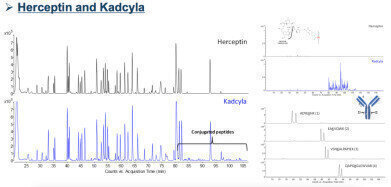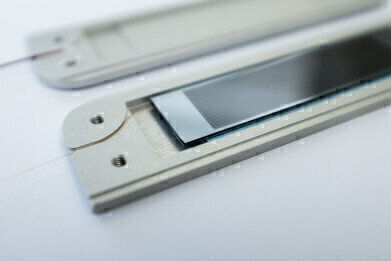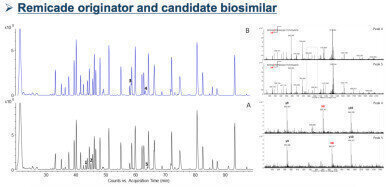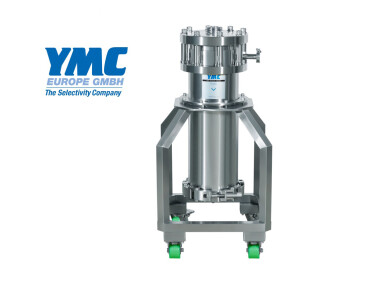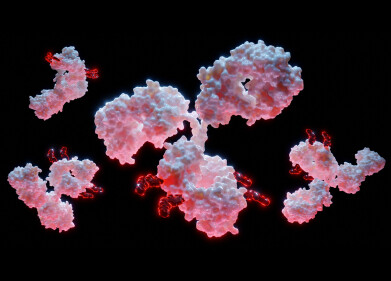Columns (LC)
µPAC™ micro-chip chromatography for mAb and ADC characterisation
Nov 22 2017
The boundaries of technology can be pushed significantly when insights from different fields are brought together to compound. PharmaFluidics has combined expertise from the analytical chromatography and semiconductor chip manufacturing industries to create a new type of LC column.
Conventional LC columns contain randomly packed beads as their stationary phase. In contrast, PharmaFluidics uses a lithographic etching process to create a perfectly ordered separation bed on a silicon chip. These new types of micro-chip based chromatography columns were named micro Pillar Array Columns or µPAC™.
The low ‘on-column’ dispersion, obtained thanks to the perfect order, virtually eliminates axial peak dispersion, resulting in higher column plate numbers with sharper peaks and higher concentration of compounds. The freestanding nature of the pillars also leads to much lower backpressure allowing the use of very long columns. These exceptional properties result in excellent chromatographic performance with high-resolution and high sensitivity. This new approach significantly improves LC analysis in complex mixtures of biological samples.
Furthermore, the micromachined separation bed in the µPAC™ forms a rigid structure that is perfectly symmetrical allowing bidirectional operation without any risk of stationary phase compression, column deterioration or stationary phase leakage. Finally, each micro-chip is identical due to the lithographic production process. Therefore, the µPAC™ column is experienced as a very robust high-resolution separation tool.
An innovative LC-MS approach for mAb and ADC characterisation
Opposed to small molecule drugs, mAbs are large (ca.150 kDa) and heterogeneous in nature. Small modifications such as glycosylations or deamidations can have a tremendous influence on the therapeutic efficacy of the compound. Many biopharmaceutical compounds are antibody-drug conjugates (ADC), where the antibodies are used to guide cytotoxic drugs to specific cells. This conjugation can happen on different sites, creating different isomers, further increasing complexity.
The value of µPAC™ columns in characterising mAbs was demonstrated recently. Using Herceptin® and a candidate biosimilar, the prevalence and location of post-translational modifications could be determined reliably. In an analysis of the ADC Kadcyla®, µPAC™’s resolving power allowed an in-depth study of conjugation sites and achieved the separation of isomeric conjugated peptides (figure 6)*. Finally, when comparing Remicade® and a candidate biosimilar, point mutations could be identified (figure 5)*. As regulatory authorities consider an identical primary sequence primordial to similarity, this biosimilar candidate should be ruled out for further development. Being able to do this in an early stage, or confirming similarity in such detail is of the greatest importance both for biopharmaceutical companies and the regulatory authorities. *(Please see images to refer to figure 5 and 6)
Join the µPAC™ community
When screening complex biological samples to discover rare molecules or when searching for tiny differences to characterize mAbs and ADCs, the µPAC™ column should be a part of your analytical laboratory. PharmaFluidics’ μPAC™ technology (micro Pillar Array Column) is unique in its kind as it is built upon the precise micromachining of designed pillar array separation beds into silicon. Due to its smart design, data productivity and robustness is no longer a concern in nano-LC.
For more information on µPAC™ technology and its applications please click here.
Events
Apr 22 2025 Kintex, South Korea
Analytica Anacon India & IndiaLabExpo
Apr 23 2025 Mumbai, India
Apr 27 2025 Portland, OR, USA
May 11 2025 Vienna, Austria
May 18 2025 Tempe. AZ, USA
